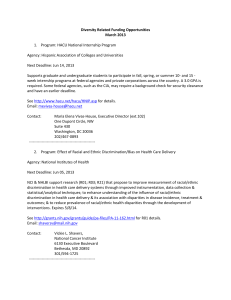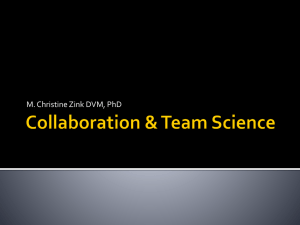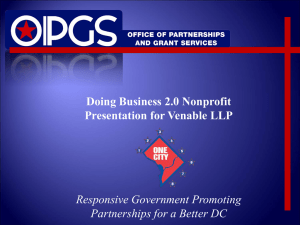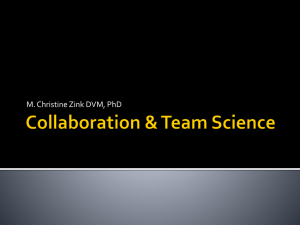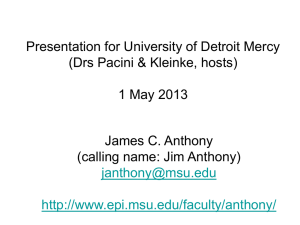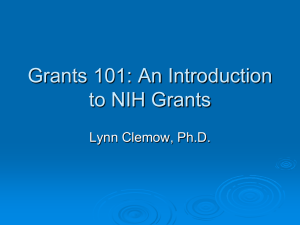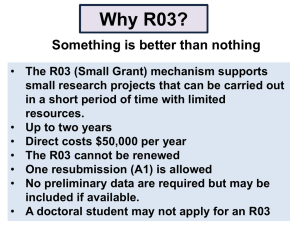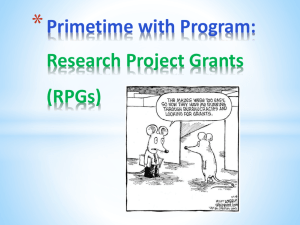NIH R03 Grant 101 - University of Central Florida
advertisement
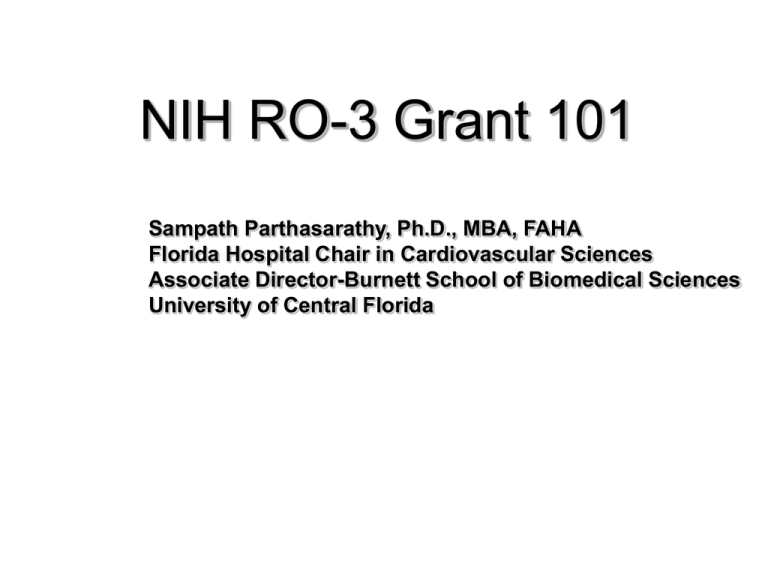
NIH RO-3 Grant 101 Sampath Parthasarathy, Ph.D., MBA, FAHA Florida Hospital Chair in Cardiovascular Sciences Associate Director-Burnett School of Biomedical Sciences University of Central Florida Why do researchers submit grant proposals? Right reasons: 1)Feel grant submission as one of the objectives of their career. 2) Feel the study will advance science and fill gap in knowledge. 3) Universities require researchers to maintain certain percent of their salaries from grant funding. Summer time salary support for many comes from grants. 4) Being a Principal investigator of a grant offers scientific independence, opportunities to manage finance, personnel, contracts, and resources. 5) Successful grants bring peer acceptance. 6) Successful grants bring emotional satisfaction, stability in life, and a better future prospects. 7) It is the right way to exercise the mind and bring bright ideas and creative solutions together. Wrong reasons: 1) Feel pressured to do so when not ready. 2) Think that they have an idea that could be submitted for funding, without adequate thinking and planning. 3) Someone told him/her that there is funding for “that type” of work. 4) “Just send and see if it clicks” attitude. 5) Need to support summer salary. 6) Expect that he/she is entitled to grant monies. 7) Superiors, friends, and others “promised” grant money. Overview of NIH Grants • The NIH offers a number of different types of grants. • NIH has many institutes and Centers. No two institutes or centers of NIH offer the same mechanisms. You need to be aware of the topic, scope, and other procedural requirements of the funding mechanisms. • Not all grant mechanisms are well known. Types of Scientific Review Groups Scientific Review Groups (SRG) CSR • Regular Study Sections • Special Study Sections • Special Emphasis Panels Institutes • Scientific Review Groups • Contract Review Committees Applications Reviewed • Research Project Grant • Academic Research Enhancement Awards • Postdoctoral Fellowships • Small Business Innovation Research • Shared Instrumentation • Program Projects • Centers • Institutional Training Grants • • • • • Contracts RFA’s Conference Grants Career Awards Some Small Grants Why do faculty fail as scientists/researchers and find it hard to sell their ideas for grant money? • Not an original thinker of ideas that could be funded. • Out of touch with current science and technology, despite ideas. • Does not pay attention to NIH rules and changes. • Great thinker but poor planner. Does not act. • Caught up with teaching, administration, and other tasks. • Spends too much time traveling and outside consulting. • Works in an area that is not mainstream, Works in an area that is “seasonal”, Works in an area that is highly competitive. • Does not think research is his/her priority. •Hired as faculty too soon and without experience . • Hired as faculty to satisfy the needs of his/her supervisor without going through the rigors of the hiring process. • Poor writing/communication skills. Great ideas need great grantsmanship. • Many beat a dead horse! •“I bring enough money-why should I write more grants”, “this position does not require me to write grants”, • Antagonized the scientific community. • Has poor credibility-tainted research-scientific and financial misconduct. • Works in an environment/department/division with no commitment/support for research. •Just wore out of the grant business. Ready to quit/retire. Common Mistakes • Low productivity, few recent papers • No collaborators recruited or no letters from collaborators • Inadequate institutional support • Not significant nor exciting nor new research • Lack of compelling rationale • Incremental and low impact research • Too ambitious, too much work proposed • Unfocused aims, unclear goals • Limited aims and uncertain future directions • Inappropriate level of experimental detail • • • • • • • • • • Feasibility of each aim not shown Little or no expertise with approach Lack of appropriate controls Not directly testing hypothesis Correlative or descriptive data Experiments not directed towards mechanisms No discussion of alternative models or hypotheses No discussion of potential pitfalls No discussion of interpretation of data No demonstration of expertise or publications in approaches NCI BY AWARD TYPE R-Series • R-Series has many different types of grants. R03, Small Research Grants, Small grants provide research support, specifically limited in time and amount, for activities such as pilot projects, testing of new techniques, or feasibility studies of innovative, high-risk research, which would provide a basis for more extended research. • R21, Exploratory/Developmental Grants, To encourage the development of new research activities in categorical program areas. (Support generally is restricted in level of support and duration.) R03 R21 2 yr 2 yr Up to $50/yr Up to $175k/yr Purpose: The R03 grant mechanism supports different types of projects including: •Pilot or feasibility studies •Secondary analysis of existing data •Small, self-contained research projects •Development of research methodology •Development of new research technology Research plan is restricted to six pages. Preliminary data are not required, particularly in applications proposing pilot or feasibility studies. (But always preliminary data helps.) Application Characteristics • You may request a project period of up to two years and a budget for direct costs of up to two $25,000 modules or $50,000 per year. • The R03 cannot be renewed • One resubmission (A1) is allowed • Introduction required for a resubmission is limited to one page. • No preliminary data are required but may be included if available. • The Research Strategy may not exceed 6 pages. • A doctoral student may not apply for an R03 grant to support thesis or dissertation research. An R03 award may be used to assist students who are pursuing dissertation studies when the work is within the scope of the R03 award. Additional Characteristics • In contrast, R21-Maximum two-year award, $275K in directs total (no more than $200K in any one year) (Six-page app). • Applications for R21 awards should describe projects distinct from those supported through the traditional R01 mechanism. For example, long-term projects, or projects designed to increase knowledge in a well-established area, will not be considered for R21 awards. • Applications submitted under this mechanism should be exploratory and novel. • These studies should break new ground or extend previous discoveries toward new directions or applications. • Projects of limited cost or scope that use widely accepted approaches and methods within well established fields are better suited for the R03 small grant mechanism. New NIH Scoring System • Funding Decisions. The new scoring system may produce more applications with identical scores (“tie” scores). Thus, other important factors, such as mission relevance and portfolio balance, will be considered in making funding decisions when grant applications are considered essentially equivalent on overall impact, based on reviewer ratings.


